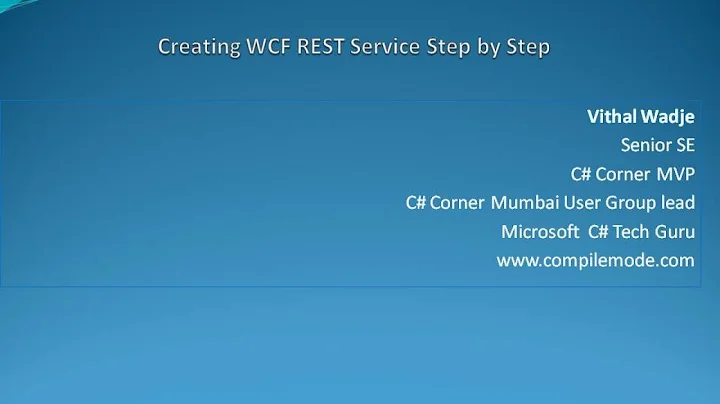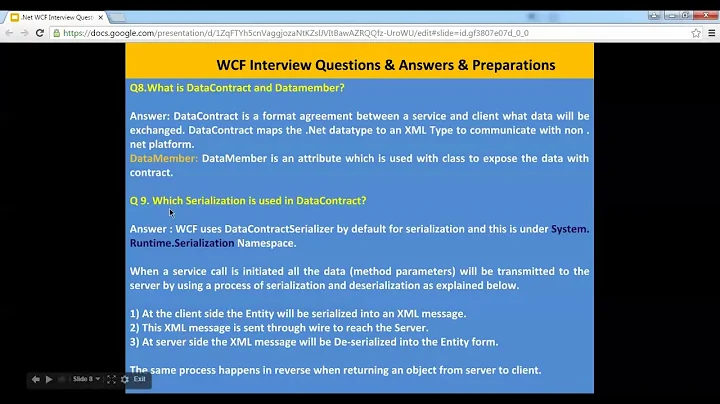wcf deserialize enum as string
Solution 1
This might be a silly question.
What happens if you do
[DataMember( Name = "foo" )]
private string foo { get; private set; }
public Foo Foo
{
get
{
return Foo.Parse(foo);
}
}
?
Solution 2
I know this is an old post, but I think it worth mentioning.
I received a similar error where the deserialization of the json string failed, seeming to deserialize to the wrong types.
The fix for me was to simply URL encode the json string before sending it to the server. A simple but easy mistake to make.
HttpUtility.UrlEncode(JSONInstruction) /*remember to encode the string*/
Related videos on Youtube
Alex
I'm a long-time (23 years as of 2018) experienced software developer with a strong preference for C#/.NET development.
Updated on October 28, 2020Comments
-
Alex over 3 years
I'm trying to consume a RESTful web service using WCF. I have no control over the format of the web service, so I have to make a few workarounds here and there. One major problem I cannot seem to get around, however, is how to make WCF deserialize an enum as a string.
This is my code (names changed, obviously):
[DataContract] public enum Foo { [EnumMember( Value = "bar" )] Bar, [EnumMember( Value = "baz" )] Baz } [DataContract] public class UNameIt { [DataMember( Name = "id" )] public long Id { get; private set; } [DataMember( Name = "name" )] public string Name { get; private set; } [DataMember( Name = "foo" )] public Foo Foo { get; private set; } }And this is the returned data that fails deserialization:
{ "id":123456, "name":"John Doe", "foo":"bar" }Finally, the exception thrown:
There was an error deserializing the object of type Service.Foo. The value 'bar' cannot be parsed as the type 'Int64'.
I do not want to switch to using the XmlSerializer, because, among its many other shortcomings, it won't let me have private setters on properties.
How do I make WCF (or, well, the DataContractSerializer) treat my enum as string values?
EDIT: Doing this seems to be impossible, and the behavior is the way it is by design. Thank you Microsoft, for not giving us options, having to resort to hacks. Doing it the way somori suggests seems to be the only way to get string enums with JSON and WCF.
-
DVA over 14 yearsHave you tried building a UNameIt object in code and using the DataContractSerializer to serialize (and then deserialize it) to see if maybe the serialization mismatches the message you receive?
-
Alex over 14 yearsThe thing is, I'm not the one doing the serialization. This JSON comes from a third party. I can't control anything about it, the only thing I have control over is the deserialization, except I guess not, because I can't get WCF to deserialize an enum the way these guys set up enums. I wish the DataContractSerializer was more flexible.
-
DVA over 14 yearsYes I understand that you have no control over it, it would maybe hint at the problem though if you could compare a self-serialized object with what you get from the third party to understand why the serializer does not like it.
-
Michael Freidgeim almost 11 yearsTry to avoid expose enums in wcf data contracts because they create subtle backwards compatible problems. See stackoverflow.com/questions/326339/…
-
Alex almost 10 years@nawfal If you pay attention, you'll see that this question was asked two months before the one you're referring to. If anything, that one is a possible duplicate of this one.
-
nawfal almost 10 years@Alex the accepted policy of SO is that you can close the older q with the newer one if latter has-received-more attention/is-better-worded etc. That said I retract my close vote because this is about
DataContractSerializerin WCF context while the other is aboutJavascriptSerializerin ASP.NET. I should be more careful! :) -
nawfal almost 10 years@Alex are you using
DataContractSerializerorDataContractJsonSerializer? -
Alex almost 10 yearsI don't even remember, this was over four years ago.
-
-
Alex over 14 yearsNo, it's not. Have you read that article yourself? Here's an interesting excerpt: Generally the data contract includes enumeration member names, not numerical values. However, when using the data contract model, if the receiving side is a WCF client, the exported schema preserves the numerical values. The problem is, I'm being a WCF client. However, the server uses string enums. I'm a little stumped...
-
 Admin over 14 yearsCould the server code be buggy? Is it possible to use data structure in this instance?
Admin over 14 yearsCould the server code be buggy? Is it possible to use data structure in this instance? -
Alex over 14 yearsThe server is not a WCF service, I think it runs Python. I can't change the way they do things, I'm just a consumer in this scenario, and I have to go by their rules.
-
Alex over 14 yearsI've tried that already, and that works, but it's a hack, and if it can be avoided, I want to avoid it.
-
Alex over 14 yearsActually, this seems to be the only way to do it, see stackoverflow.com/questions/794838/…
-
Ruan Mendes about 10 yearsYou would need a setter also, wouldn't you?
-
Alex about 6 yearsSorry for the much too late reply, @JuanMendes, but no, not for the specific use case I had. The deserializer would only write to the
fooproperty, and since I only needed deserialization, I'd only need to read theFoovalue, never set it.









